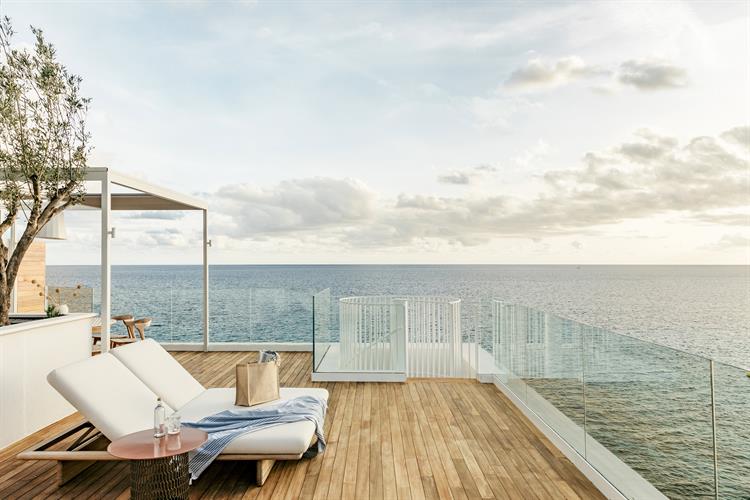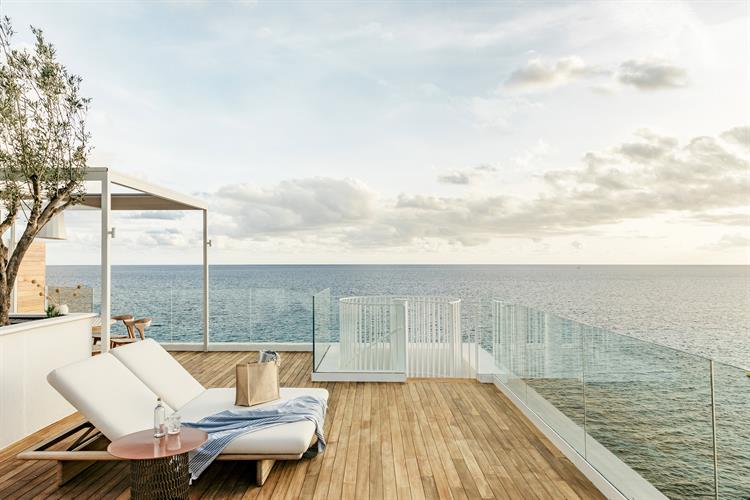Gran Meliá’s Villa Le Blanc hotel will be Carbon Neutral by the end of the 2024 season, balancing the emissions it produces and those it eliminates, generating a positive impact on the atmosphere
July 21, 2024
July 21, 2024

Thanks to the initiatives of the Net Zero Hotel project, for every kilo of Co2 emitted, the emission of 1.8 kilos is avoided
Meliá has recently been recognised by TIME magazine as the world’s most sustainable company in the tourism sector, included in the World’s Most Sustainable Companies of 2024 ranking
Meliá ha sido recientemente reconocida por la revista TIME como la compañía del sector turístico más sostenible del mundo, incluida en el ranking World’s Most Sustainable Companies of 2024

Two years ago, the Gran Meliá Villa le Blanc hotel was inaugurated on the idyllic beach of Santo Tomás (Menorca). The property, designed as a pilot project for an energy-neutral and carbon-neutral hotel (scopes 1 and 2), was built on the structure of a former Meliá Hotels International hotel, taking up all its hotel know-how to become a benchmark in quality and service, and incorporating the latest generation facilities and systems to become an efficient hotel in energy and water management.
To this end, the hotel’s Mediterranean architecture, based on the Group’s sustainable construction manuals, also maximises the use of natural ventilation thanks to the layout of the spaces, courtyards and draughts, and combines energy efficiency criteria and systems with the use of renewable energies, purchased and self-generated at the hotel. The energy sources used by the hotel prioritises biomass-based energy -mainly pellets or vegetable waste purchased on the island of Menorca- certified renewable electricity and that produced by the 300m2 of photovoltaic panels installed, so that only 27% of the energy used by the hotel still comes from fossil fuels.
After closing its first full year of running-in and operation in 2023, what was a ‘pilot project’ in terms of decarbonisation could become a reality this year, as the hotel’s emissions balance for the first half of 2024 is very close to achieving energy neutrality. Thus, thanks to the generation of bioenergy through biomass, the emission of more than 119 TnCO2 into the atmosphere will have been avoided, which, added to the use of certified green energy (which avoided the emission of 89 Tn of CO2) and the self-production of photovoltaic energy, adds up to a total of 222 Tn of CO2 avoided between January and June (75% of the total potential emissions). For the collection and processing of data, the company uses procedures aligned with the European CSRD (Corporate Sustainability Reporting Directive).
For Beatriz Avila, General Manager of the hotel, the path followed by this hotel is the right one, since “From the beginning we knew that making this hotel climate sustainable was a great opportunity, due to its location on an island like Menorca, a biosphere reserve, and because it was rebuilt practically from scratch at a time when we are all, companies and society, highly aware; at the same time, the project represented a challenge, due to the cultural and operational change it implied, and because the hotel had to maintain the highest standards of luxury and service typical of the brand. Today we have shown that a more sustainable hotel is possible, and also that it is possible to combine luxury and sustainability.”
These advances, which the Company expects to extend in the coming months by optimising the systems after the first few seasons, as well as by using geothermal systems for cooling and air conditioning, and complementing them by purchasing carbon credits to offset the residual emissions that are still produced (25%), allow us to aim for the end of this year to achieve the goal set by the Company of making the Gran Meliá Villa le Blanc the first carbon-neutral hotel in terms of energy consumption. As Gabriel Escarrer, Chairman and CEO of Meliá, recalls, “energy neutrality is an essential step towards achieving climate neutrality or ‘Net Zero’, and although much remains to be done, we believe that this project marks the right path for many hotels to follow.”
In addition to energy neutrality, the hotel takes into account that Menorca is considered a ‘water stress zone’, so it also pursues among its objectives the efficient use of water, with recovery systems that have reduced water consumption by around 52%. Likewise, the hotel applies the criteria of eliminating single-use plastics, for which 100% of the water bottles it uses are made of glass, and it also offers free filtered water dispensers for its guests.
For Gabriel Escarrer, “With the data we have from the first year and a half of operation, we believe that the Gran Meliá Villa Le Blanc could become our first carbon neutral hotel in scopes 1 and 2 (related to energy consumption) by the end of this year, which represents another step in the sector’s transition towards sustainability, also demonstrating that it is possible to aspire to climate neutrality with a sophisticated luxury hotel in a vulnerable environment such as the island of Menorca. Projects like this allow us to believe that the decarbonisation objectives of our activity, necessary to achieve the scenario of limiting global warming to 1.5º above pre-industrial levels in 2030, are possible.”
New international recognition in Sustainability
Meliá Hotels International has recently been recognised by TIME magazine as the world’s most sustainable company in the tourism sector, included in the World’s Most Sustainable Companies of 2024 ranking, which includes the 500 leading companies in corporate social responsibility from more than 30 countries.
This is the first time that this prestigious international publication has carried out this study, together with the data analysis firm Statista, through a rigorous evaluation process of more than 5,000 companies. Its methodology includes the analysis of 20 key indicators related to environmental and social management, information transparency, public commitment aligned with internationally recognised standards (such as the STBi initiative) or the results of external assessments, such as the Carbon Disclosure Project (CDP) or the S&P Global Sustainability Yearbook, among others.
Meliá ranks 114th in the ranking, the eighth of the 25 Spanish companies in the ranking, as well as the first in its sector globally.